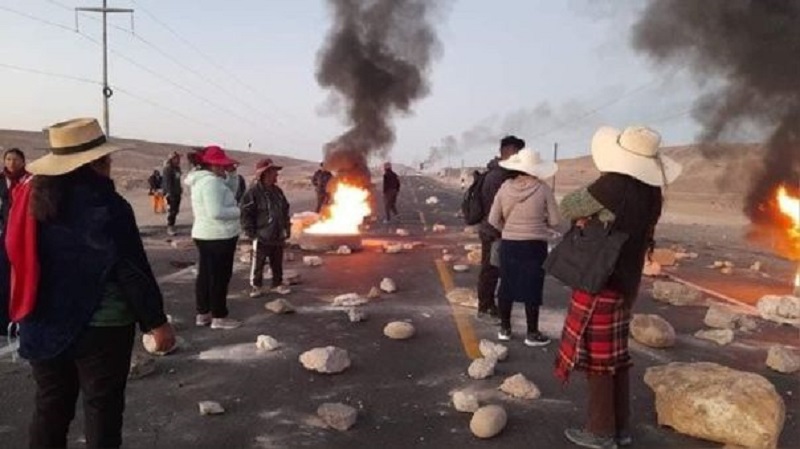
Despite the eventual retreat in the process of struggle that is taking place in the rest of the country, residents of the highland region of Puno maintain forceful measures such as blocking the main access roads and staggered strikes. The population of this high Andean region demands the immediate resignation of Dina Boluarte, responsible for the more than 70 civilians killed by the repressive forces so far in the popular uprising, 21 of which occurred in this region.
Last Monday, February 20, thousands of community members and peasants from the towns and provinces of Yunguyo, Chucuito-Juli, Ilave, Laraqueri, Acora, among other towns, arrived in the city of Puno, where they carried out a massive mobilization. There they reinforced the measures of force that have been carried out there since January 4 when the indefinite strike was declared against the coup government of Boluarte.
In this new protest action, the protesters at all times expressed their categorical rejection of the government, responsible for the brutal military police repression that the executive has been implementing since the protests began, days after Congress vacated, via parliamentary coup, the Former President Pedro Castillo.
Let us remember that in the Puno region there was a brutal police repression that caused the death of 21 civilians, which later strengthened the mobilizations. It led many residents of this and other regions of the so-called “deep Peru” to move to the city of Lima in what was called “the taking of Lima” or the “second march of the four of them”.
To date, the Puno region has become the main bastion of resistance against the coup and repressive government of Dina Boluarte. In the rest of the interior regions of the country, and in the city of Lima itself (where dynamic and large mobilizations were held at the time) these have decreased considerably. This would be related to the wear and tear of the struggle process (which has already been going on for more than two months), which has not yet managed to compromise the participation of strategic sectors of the working class. Nor did it give life to truly representative spaces for centralization and self-organization on a national scale that could compromise the participation of other sectors and thus ensure the materialization of the political general strike.
The displacement of a large number of protesters in Puno is recorded, presumably to continue with the roadblocks. Puno is the only region that has had blocked roads since the beginning of this year. @elcomercio_peru @PeruECpe. pic.twitter.com/mYOswDVgKV
— Sebastián Ramírez Mendoza (@chinoramirezof) February 21, 2023
As is known, the Puno region has been declared in a state of emergency and even, due to the forcefulness of the protests, immobility was declared. However, the population has not stopped blocking the roads and paralyzing the main economic activities, repeatedly confronting the national police and the army itself. Although they have made them go back when they tried to enter some communities or avoid the actions of the protesters.
In this understanding, David Yujra, a member of the struggle committee of the Juli-Puno province, stated that: “We are not going to get tired. For us the strike continues. For us there is no dialogue. The only thing we want is for Dina Boluarte to resign. At this moment, despite the fact that they have killed 21 of our countrymen, now they want to humiliate us more by sending us soldiers. They are provoking us more and more. We will carry on, no matter what.”
Puno is one of the poorest regions of Peru where the population is mostly of Aymara origin, therefore, the rates of racial discrimination are very high. In these last thirty years of implementation of neoliberal policies in most regions of the so-called “deep Peru” (Puno, Ayacucho, Huancavelica, Madres de Dios, the peripheral neighborhoods of Lima) poverty and extreme poverty, as well as the lack of basic services and labor informality have grown significantly. Where not by chance the mobilizations were more forceful. For this reason, the delegitimization of state institutions and political parties that are part of the ’93 regime is also very high.
That is why, beyond the eventual withdrawal of the mobilizations that is currently taking place, the current crisis of the regime will not end easily. For this reason, the possibility that we will see new social outbreaks on a national scale remains latent. This also demonstrates the need to give continuity to the struggle for a Free and Sovereign Constituent Assembly born from the ruins of the 1993 regime within the framework of worker and popular mobilization and self-organization.
Source: www.laizquierdadiario.com

